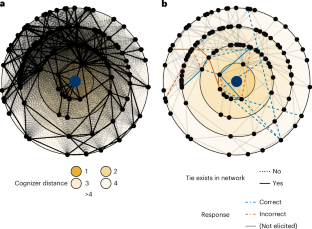People not only inhabit social networks, but also form beliefs about their social world. We assessed these beliefs in isolated villages in Honduras, and found that individuals overestimated kinship ties in their social networks, misperceived ties across social and economic lines, and exhibited perceptual biases that systematically varied.
This is a preview of subscription content, access via your institution
Access options
Access Nature and 54 other Nature Portfolio journals
Get Nature+, our best-value online-access subscription
$32.99 / 30 days
cancel any time
Subscribe to this journal
Receive 12 digital issues and online access to articles
$119.00 per year
only $9.92 per issue
Buy this article
- Purchase on SpringerLink
- Instant access to full article PDF
Prices may be subject to local taxes which are calculated during checkout

References
-
Bourdieu, P. Distinction: A Social Critique of the Judgement of Taste (Harvard Univ. Press, 1979). A book that explores how social structures and cultural capital shape perceptions and behaviours, which represents the common assumption that individuals have little-to-no explicit knowledge of social structure.
-
Ballester, C., Calvó-Armengol, A. & Zenou, Y. Who’s who in networks. Wanted: the key player. Econometrica 74, 1403–1417 (2006). A paper that develops a model of strategic interactions in networks that assumes complete knowledge of network structure, which highlights extant theoretical assumptions.
-
Brands, R. A. Cognitive social structures in social network research: a review. J. Organ. Behav. 34, S82–S103 (2013). A review that provides a comprehensive overview of research on social network cognition.
-
Krackhardt, D. Cognitive social structures. Soc. Netw. 9, 109–134 (1987). A paper that reports early results on social network cognition.
-
Airoldi, E. M. & Christakis, N. A. Induction of social contagion for diverse outcomes in structured experiments in isolated villages. Science 384, eadi5147 (2024). A paper showing the effect of experimentally induced social contagion in the same Honduran context as in the current work.
-
Henrich, J. The WEIRDest People in the World: How the West Became Psychologically Peculiar and Particularly Prosperous (Penguin UK, 2020). A book that explores cultural and psychological variation across societies, and underscores the importance of studying human behaviour beyond WEIRD populations.
Additional information
Publisher’s note Springer Nature remains neutral with regard to jurisdictional claims in published maps and institutional affiliations.
This is a summary of: Feltham, E. et al. Cognitive representations of social networks in isolated villages. Nat. Hum. Behav. https://doi.org/10.1038/s41562-025-02221-6 (2025).
Rights and permissions
About this article
Cite this article
Social network cognition among isolated villagers reveals distinct patterns of bias.
Nat Hum Behav (2025). https://doi.org/10.1038/s41562-025-02222-5
-
Published:
-
DOI: https://doi.org/10.1038/s41562-025-02222-5
This post was originally published on this site be sure to check out more of their content







